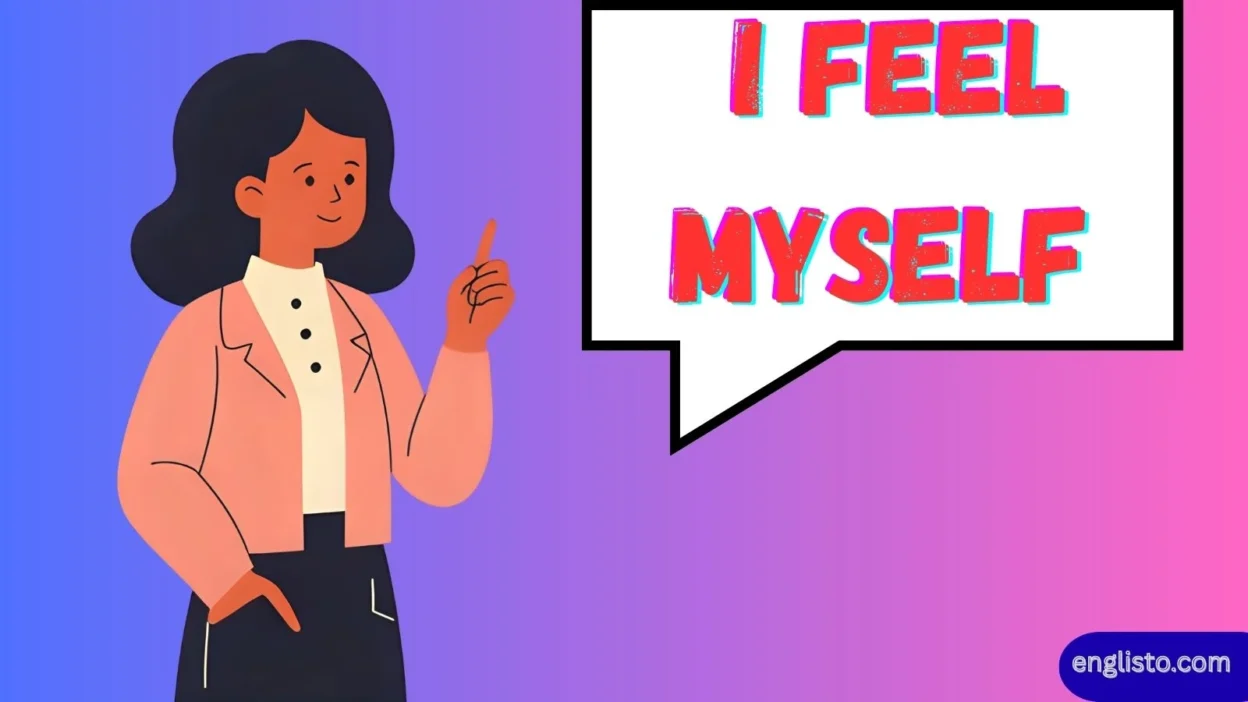Language is full of expressions that say much more than the literal words suggest. One of these expressions is “I feel myself.” Depending on the context, tone, and culture, this phrase can carry several layers of meaning—ranging from a simple statement about one’s health to a confident declaration of empowerment. I Feel Myself.
In this article, we’ll dive deep into what “I feel myself” means, how it’s used in real life, its grammatical roots, cultural significance, and even the possible pitfalls of misunderstanding it. Whether you’ve heard it in a song, a casual conversation, or on social media, this guide will help you understand every nuance.
What Does “I Feel Myself” Mean?
At its simplest, “I feel myself” refers to a state of awareness of one’s own being—physically, mentally, or emotionally. Yet, it can mean very different things depending on the context:
- Literal meaning: Touching or physically checking one’s own body (often after an injury or when unwell).
- Idiomatic meaning: Returning to one’s usual state, mood, or health.
- Figurative/modern slang: Feeling confident, proud, stylish, or fully aligned with one’s authentic self.
- Sexual connotation: Referring to masturbation, though this is not the primary or most common interpretation.
This range of interpretations makes the idiom rich but also tricky. Misunderstanding the phrase could cause awkward moments, especially in cross-cultural settings.
Read More: Testing the Waters – Idiom: Meaning, Origin, and Real-Life Applications
The Idiomatic Core: “Feeling Like Yourself Again”
Traditionally, when someone says, “I feel myself again,” they usually mean:
- They’re recovering from illness: “After a week of flu, I finally feel myself again.”
- They’re back to their usual mood after stress or sadness: “I was really down after the breakup, but now I’m starting to feel myself again.”
Here, “myself” is a reflexive pronoun used to express normalcy or a return to one’s authentic self.
| Phrase Example | Meaning | Tone |
| “I don’t feel myself today.” | I feel unwell or off. | Neutral, health-related |
| “I feel myself again.” | I’m back to normal health or mood. | Positive, reassuring |
| “I feel myself when I’m dancing.” | I feel truly authentic, alive, or natural. | Expressive, empowering |
Modern Slang: “I’m Feeling Myself”
In the early 2000s hip-hop and R&B scene, the phrase evolved. Artists like Beyoncé, Nicki Minaj, and Rihanna popularized “I’m feeling myself” as a way of saying:
- I look good.
- I’m confident.
- I’m proud of my achievements.
- I’m fully in my element.
On social media platforms like Instagram and TikTok, it became shorthand for celebrating self-love, style, and empowerment. Phrases like “ifeelmyself” often accompany selfies, dance clips, or moments of pride.
Example:
- “Just got a promotion—really feeling myself today!”
- Caption on Instagram: “New haircut, new vibe ✨ #feelingmyself”
This figurative sense is rooted in self-assurance, body positivity, and owning your vibe.
Literal vs. Figurative Meanings
Understanding the context is key. Let’s break it down:
| Usage Type | Example Sentence | Interpretation |
| Literal – Physical Touch | “After the accident, I felt myself to check if my arm was broken.” | Actual physical action of touching or checking. |
| Idiomatic – Health/Well-being | “I don’t feel myself with this flu.” | Feeling unwell or not in usual condition. |
| Figurative – Confidence | “She walked into the meeting feeling herself.” | Confidence, empowerment, pride. |
| Sexual Connotation | “He admitted he felt himself last night.” | Refers to masturbation (explicit, avoid in formal use). |
Emotional, Mental, and Physical Dimensions
“I feel myself” is not just about grammar—it’s about awareness of self. The phrase touches on different states:
- Physical state: sensing injury, health, or bodily awareness.
- Mental state: clarity, cognitive balance, focus.
- Emotional state: moods, self-reflection, confidence, or insecurity.
- Spiritual state: inner connection, mindfulness, and alignment with values.
For example:
- Physical: “After exercise, I really feel myself—full of energy.”
- Emotional: “Meditation helps me feel myself, calm and centered.”
- Spiritual: “In nature, I feel myself connected to something bigger.”
Grammatical Nuances
From a grammar perspective, “myself” is a reflexive pronoun. Normally, reflexive pronouns show that the subject and object of a verb are the same:
- “I hurt myself.”
- “I taught myself guitar.”
But in “I feel myself”, the reflexive pronoun takes on a more idiomatic function—expressing a return to one’s normal state or alignment.
In English grammar:
- Correct: “I don’t feel myself today.”
- Incorrect: “I don’t feel me today.” (ungrammatical in this idiomatic sense).
Interestingly, in some languages (like Russian), reflexives work differently, leading to confusion for non-native speakers.
Cultural Perspectives
The meaning of “I feel myself” changes across cultures:
- Western/English-speaking cultures: Confidence, health, or idiomatic expression.
- Slavic languages: Literal reflexive pronoun use can lead to misinterpretation.
- Digital culture: Instagram, Twitter, and TikTok made it trendy, linked with style and empowerment.
- Music culture: Hip-hop and R&B normalized it as a confidence anthem.
This cross-cultural variance makes it both fascinating and sometimes confusing.
Real-Life Usage Examples
Here are common scenarios where you might hear or use the phrase:
- Health: “Since the surgery, I haven’t felt myself.”
- Mood: “After therapy, I finally feel myself again.”
- Confidence: “With this new outfit, I’m really feeling myself.”
- Relationships: “He makes me feel myself—comfortable and authentic.”
- Work/Success: “Got the deal signed today, feeling myself!”
Tables of Synonyms and Alternatives
Sometimes, it’s easier to use alternatives if the idiom feels confusing.
| Meaning | Synonyms / Alternatives |
| Not feeling well | I feel unwell, I’m off, I feel under the weather, I don’t feel right. |
| Back to normal | I feel like myself again, I feel back to normal, I’m better now. |
| Confident | I’m on top of the world, I feel amazing, I’m in my element, I’m owning it. |
| Empowered | I feel aligned, I’m proud of myself, I’m glowing, I’m unstoppable. |
Common Mistakes and Misunderstandings
Because of its multiple meanings, mistakes happen:
- Misuse: Using it in formal business writing to mean “confident.” (Better to say “I feel confident.”)
- Misunderstanding: Non-native speakers may think it always refers to touching the body.
- Overuse on social media: Can sound cocky or self-absorbed if not balanced with humility.
Mindfulness and Self-Reflection
Beyond grammar, “I feel myself” can be seen as an invitation to check in with yourself:
- Journaling: “Today I don’t feel myself—time to explore why.”
- Meditation: noticing bodily sensations and emotions.
- Therapy: verbalizing self-perception and mental wellness.
It’s not just a phrase—it’s a practice of awareness, presence, and authenticity.
FAQs about “I Feel Myself”
Q1: Does “I feel myself” always mean something sexual?
No. While it can have that meaning, in most contexts it refers to confidence, health, or authenticity.
Q2: Is it correct to say “I don’t feel myself today”?
Yes, it’s grammatically correct and idiomatic. It usually means you’re unwell or not in your usual mood.
Q3: What’s the difference between “I feel myself” and “I feel like myself”?
- “I feel myself” = idiom, often health/mood-related.
- “I feel like myself” = clearer, avoids sexual misunderstanding, more common in American English.
Q4: Why do celebrities say “I’m feeling myself”?
It’s slang for confidence, pride, and being in your element—popularized in hip-hop and social media.
Q5: Can I use it in professional settings?
Use caution. In business, it’s safer to say “I feel confident” or “I feel back to normal.”
Conclusion
The phrase “I feel myself” is layered, versatile, and deeply tied to context. From describing illness recovery to celebrating confidence on Instagram, it’s an idiom that reflects both inner awareness and cultural evolution.
- In health: it’s about returning to your normal self.
- In slang: it’s about owning your confidence.
- In grammar: it’s a reflexive idiom with unique English nuances.
- In mindfulness: it’s a reminder to check in with your inner state.
Used well, it’s a powerful expression of identity, presence, and self-love.



